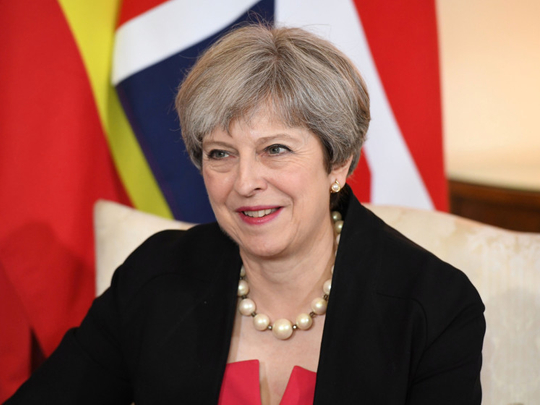
The United Kingdom and European Union entered last Monday into their first full week of formal Brexit negotiations in Brussels. Following last month’s United Kingdom general election, there are growing signs that the challenges of the exit process may prove too great for Prime Minister Theresa May’s fragile minority government to withstand.
This has created a political paradox whereby there is growing domestic pressure in Britain post-election for a soft Brexit. Yet the weakness of May’s administration means it may not now be resilient enough to survive the course of negotiations, raising the odds that the nation may leave the EU with the hardest and most disorderly of all exits. That is, without any deal over the UK’s future relationship with the continent, especially over trade.
Some five weeks after June’s election, it is already clear the result has transformed the context for the Brexit battles to come. May had previously hoped a big victory would allow her to deliver her vision of leaving all “bits” of the EU, including membership of the Single Market and Customs Union, while securing a comprehensive new trade deal.
Yet today her Brexit ambitions are being challenged with much greater vigour. Domestically, for instance, there is a changed power balance between her, the ruling Conservatives, and other domestic politicians and parties in Westminster and beyond.
May had previously appeared to dominate the political landscape. Yet now it is highly uncertain that she will last as prime minister for the potentially full two year duration of the Brexit talks set down by Article 50. Week before last, for instance, the British government introduced its so-called ‘Great Repeal Bill’, which will end the supremacy of EU law in the UK and transfer EU law on to the UK statute book. This will be a massive legislative undertaking and it is possible the government could lose key votes surrounding this bill, which could potentially trigger another general election in coming months.
The government’s weakness stems in large part from the changed post-election distribution of power within the House of Commons. On Brexit, there is potentially now a majority in the 650-member chamber for a softer EU exit than May favours — with the overwhelming number of opposition MPs plus perhaps around a couple of dozen Tories favouring this outcome.
Reflecting this, there is renewed post-election speculation about whether a deal might be possible that would see Britain remain a member of the Single Market, especially if new immigration restrictions can potentially be agreed with the EU. While that outcome still appears unlikely, given the commitment of Brussels to the four freedoms, even arch-Brexiteer Nigel Farage has said post-election that “I think we are probably headed towards a Norway-type situation, two-and-a-half years down the road”.
The red line for DUPWhat Farage highlights is the possibility of the nation moving toward a European Economic Area (EEA)-type model, which would see departure from the EU, but retention of full access to the Single Market. This possibility, at least as a transitional measure for several years, is being actively discussed by a group led by Labour’s Stephen Kinnock and at least 15 Tory members of parliament.
Kinnock’s belief is that EEA membership would deliver greater certainty in the short to medium term for UK business and workers, while potentially allowing more time to negotiate a final Brexit settlement. At the same time, he is hopeful a mini-deal might be possible that makes it possible to prevent EU nationals coming to the UK unless they already have jobs to go to, without violating EU rules on free movement.
An example of how May’s Brexit visit could get watered down is because of her pact with the Democratic Unionist party (DUP) whose contingent of 10 MPs from Northern Ireland has agreed to support the government on key votes. While the prime minister has previously said she wants to cast aside full membership of the Customs Union, this could well be a red line for the DUP.
The reason the DUP is concerned about leaving the Customs Union is that it would likely result in a harder border between the Republic of Ireland and Northern Ireland which will be, post-Brexit, the only land-crossing between the UK and the EU. With cross-border trade between the two countries worth more than €3 billion (Dh12.63 billion) a year, few want to see this disrupted. Yet, if the UK fails to stay in the Customs Union nor strike a new trade deal with the EU, UK exports will be hit by the common EU external tariff, which would require customs checks on the Irish border.
Yet one of the big paradoxes of UK politics right now is that at the same time that there is growing momentum for a softer Brexit, there is also a growing possibility that the nation may be heading for the hardest and most disorderly of all exits. That is, leaving the EU without any deal over its future relationship with the continent.
This is because May’s minority government could simply not now be resilient enough to survive the course of negotiations, and/or have the political capital to make the tough decisions necessary to see such an agreement brokered. Indeed, Brussels is concerned that it simply may not be possible to have proper negotiations in the coming months.
As the EU27 do not want to agree to an early extension of the two-year Brexit talks, Brussels has therefore decided to ratchet up pressure on May and move negotiations on as fast as possible, whether her team is ready or not.
Unless there is now stronger, constructive leadership from all sides, the odds are correspondingly growing that no deal will be reached and the UK will crash out of the EU with the hardest of hard Brexits, damaging the EU too.
Andrew Hammond is an Associate at LSE IDEAS at the London School of Economics.












